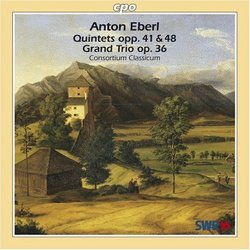| All Artists: Anton Eberl, Consortium Classicum Title: Eberl: Grand Quintetto Op 41 / Grand Trio Op 36 Members Wishing: 0 Total Copies: 0 Label: Cpo Records Original Release Date: 1/1/2007 Re-Release Date: 8/28/2007 Genre: Classical Styles: Chamber Music, Historical Periods, Classical (c.1770-1830) Number of Discs: 1 SwapaCD Credits: 1 UPC: 761203718429 |
Search - Anton Eberl, Consortium Classicum :: Eberl: Grand Quintetto Op 41 / Grand Trio Op 36
 | Anton Eberl, Consortium Classicum Eberl: Grand Quintetto Op 41 / Grand Trio Op 36 Genre: Classical |
Larger Image |
CD Details |
CD ReviewsMozartean Chamber Music J Scott Morrison | Middlebury VT, USA | 09/06/2007 (4 out of 5 stars) "All but forgotten now, in his day Anton Eberl (1765-1807) was well-known and considered a musical heir of Mozart. Indeed as recently as 1944 one of his symphonies was published as being a newly discovered work of Mozart. During his lifetime a number of his compositions were published under Mozart's name, some of them through as many a fourteen subsequent editions. It is easy to understand why his music could have been mistaken for that of the Salzburg master's. Indeed, he may actually have studied for a time with Mozart who in any case befriended and encouraged him. Eberl was born into a well-off family that went into bankruptcy while he was in law school; this allowed him to quit school and go to work as a musician -- which is what he'd wanted all along -- to help out the family finances. He had been a child prodigy pianist, giving recitals as early as age eight, and his first opera was presented when he was eleven.
The three pieces presented here are chamber works that include strings, winds and piano. All are expertly constructed and abound in memorable thematic material. They are played beautifully by Consortium Classicum, a group with varying membership drawn from German orchestras. They are led by their founder, the gifted clarinetist Dieter Klöcker, who appears here in the Grand Quintetto and the Quintuor Brillant. The excellent German pianist Thomas Duis plays in all the works and shows himself to be a technically accomplished and musically sophisticated participant. The Grand Quintetto in G Minor, Op. 41, was published posthumously by Eberl's widow in 1807. It clearly takes its impetus from Mozart's Piano Quartet, K.478 whose construction and even whose themes it all but copies. Still there are evidences that Eberl was trying to go beyond his mentor's models and indeed there is some overlay of proto-Romantic expression, especially in the Adagio with its rather more complex harmonies and asymmetric phrase lengths. The Grand Trio in E Flat, Op. 36, is for clarinet, cello and piano, and is a thing of great beauty. One might imagine it would be modeled on Mozart's Kegelstatt Trio with the same instrumentation but in fact it would be more apt to compare it to several of Haydn's piano trios in that the piano is the clear star performer here, with the other two instruments playing a more or less accompanimental role. The clarinet has some opportunities to introduce themes but this is usually followed by the pianist's showy elaboration of its materials. This is reasonably weighty and technically complex music but the pianist's virtuosic abilities are never in doubt. The Quintuor Brillant in C, Op. 48, is for oboe, violin, viola, cello and piano and though it has a late opus number and was published in 1808 after his death, there is internal evidence that this is an early work. It has simpler harmonies and more straightforward construction. It does not particularly remind one of Mozart's Oboe Quartet, a towering masterpiece, but rather has some reminiscences of mid-period Mozart piano concertos. Indeed, it reminds me of the piano and string quartet arrangement of Mozart's K.414 concerto. It is not a profound work but is nonetheless entirely enjoyable. It is given a rousing performance here. I was less than thrilled with the slightly acidulous tone of oboist Gernot Schmallfuss, but that is a matter of individual taste. Overall, I can give this issue a moderately enthusiastic recommendation. It is probably not for everyone, but it certainly is worth calling to the attention of those who are fascinated by music written at the cusp of the late Classical and early Romantic era. Scott Morrison " |
